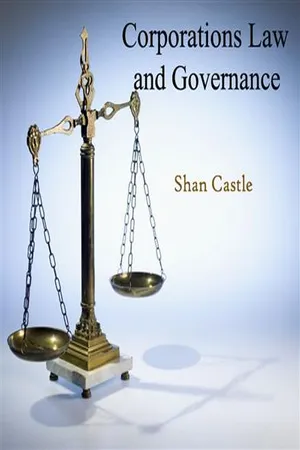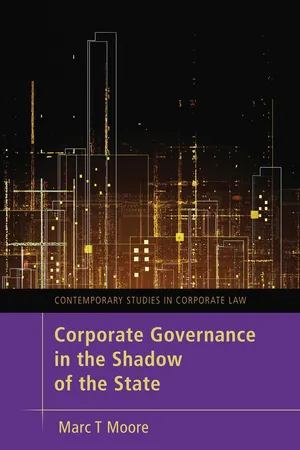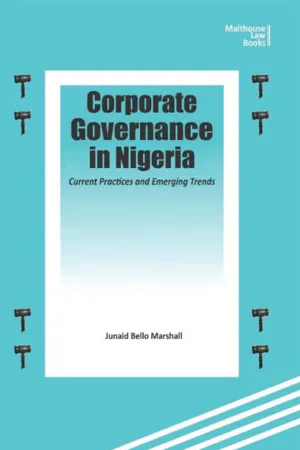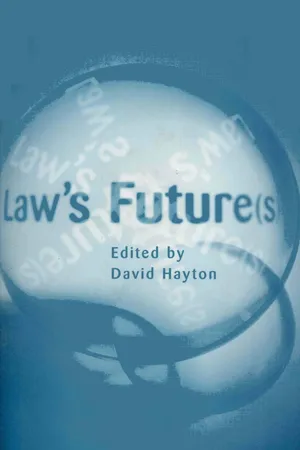Law
Corporate Law
Corporate law encompasses the legal rules and regulations that govern the formation, operation, and dissolution of corporations. It covers a wide range of issues, including corporate governance, compliance, mergers and acquisitions, and shareholder rights. Corporate law aims to provide a framework for the functioning of businesses and ensure accountability and transparency in corporate activities.
Written by Perlego with AI-assistance
Related key terms
1 of 5
9 Key excerpts on "Corporate Law"
- No longer available |Learn more
- (Author)
- 2014(Publication Date)
- Orange Apple(Publisher)
____________________ WORLD TECHNOLOGIES ____________________ Chapter- 4 Corporate Law Corporate Law (also company or corporations law) is the law of the most dominant kind of business enterprise in the modern world. Corporate Law is the study of how shareholders, directors, employees, creditors, and other stakeholders such as consumers, the community and the environment interact with one another under the internal rules of the firm. A major contributor to company law in the Uk is the companies act 2006. Corporate Law is a part of a broader companies law (or law of business associations). Other types of business associations can include partnerships (like most law firms. In the UK partnerships are governed by the Partnership Act 1890 ), or trusts (like a pension fund) or companies limited by guarantee (like some universities or charities). Corporate Law is about big business, which has separate legal personality, with limited liability or unlimited liability for its members or shareholders, who buy and sell their stocks depending on the performance of the board of directors. It deals with the firms that are incorporated or registered under the corporate or company law of a sovereign state or their subnational states. - No longer available |Learn more
- (Author)
- 2014(Publication Date)
- College Publishing House(Publisher)
Corporate Law is often divided into corporate governance (which concerns the various power relations within a corporation) and corporate finance (which concerns the rules on how capital is used). _____________WORLD TECHNOLOGIES_____________ Corporate Law in context Definition The word corporation is generally synonymous with large publicly owned companies. In the United States, a company may or may not be a separate legal entity, and is often used synonymously with firm or business. A corporation may accurately be called a company; however, a company should not necessarily be called a corporation, which has distinct characteristics. According to Black's Law Dictionary, in the U.S. a company means a corporation — or, less commonly, an association, partnership or union — that carries on industrial enterprise. The defining feature of a corporation is its legal independence from the people who create it. If a corporation fails, its shareholders will lose their money, and employees will lose their jobs, though disproportionately affecting its workers as opposed to its upper executives. Shareholders, however owning a part piece of the company, are not liable for debts that remain owing to the corporation's creditors. This rule is called limited liability, and it is why corporations end with Ltd. (or some variant like Inc. and plc). In the words of British judge, Walton J, a company is... ...only a juristic figment of the imagination, lacking both a body to be kicked and a soul to be damned. But despite this, corporations are recognized by the law to have rights and responsibilities like actual people. Corporations can exercise human rights against real individuals and the state, and they may be responsible for human rights violations. Just as they are born into existence through its members obtaining a certificate of incorporation, they can die when they lose money into insolvency. Corporations can even be convicted of criminal offences, such as fraud and manslaughter . - No longer available |Learn more
- (Author)
- 2014(Publication Date)
- Library Press(Publisher)
____________________ WORLD TECHNOLOGIES ____________________ Chapter- 3 Corporate Law Corporate Law (also company or corporations law) is the law of the most dominant kind of business enterprise in the modern world. Corporate Law is the study of how shareholders, directors, employees, creditors, and other stakeholders such as consumers, the community and the environment interact with one another under the internal rules of the firm. Corporate Law is a part of a broader companies law (or law of business associations). Other types of business associations can include partnerships (like most law firms), or trusts (like a pension fund) or companies limited by guarantee (like some universities or charities). Corporate Law is about big business, which has separate legal personality, with limited liability or unlimited liability for its members or shareholders, who buy and sell their stocks depending on the performance of the board of directors. It deals with the firms that are incorporated or registered under the corporate or company law of a sovereign state or their subnational states. The four defining characteristics of the modern corporation are: • Separate Legal Personality of the corporation (the right to sue and be sued in its own name i.e. the law treats the company as a human being) • Limited Liability of the shareholders (so that when the company is insolvent, they only owe the money that they subscribed for in shares) • Transferable Shares (usually on a listed exchange, such as the London Stock Exchange, New York Stock Exchange or Euronext in Paris) ____________________ WORLD TECHNOLOGIES ____________________ • Delegated Management, in other words, control of the company placed in the hands of a board of directors In most developed countries excluding the English speaking world, company boards are appointed as representatives of both shareholders and employees to codetermine company strategy. - eBook - PDF
Private Law
Key Encounters with Public Law
- Kit Barker, Darryn Jensen(Authors)
- 2013(Publication Date)
- Cambridge University Press(Publisher)
265 9 Discerning public law concepts in Corporate Law discourse Anita K. Krug 1 Introduction Tell many an academic that you are a scholar of corporate governance or that your research interests centre on Corporate Law, and, in return, the suggestion will likely be made, at some point, that your work falls within the realm of ‘private law’. Indeed, among both scholars and policy-makers there remains a widely shared, and apparently stubborn, assumption that Corporate Law and its myriad permutations are firmly anchored in the realm of private law, alongside a group of other fields considered to be on the private law side of the public law/private law dichotomy. Accordingly, Corporate Law is grouped with the fields of tort law, property law and contract law and, therefore, placed in contrast with constitutional law, administrative law and criminal law, and other classic public law fields – the latter so labelled because these fields of law govern the relationship between the state, as the representative of the ‘public’, and its subjects. The basis for this classification is not particularly difficult to discern. However, its persistence is, particularly given global legal and regulatory develop- ments in the past eighty-plus years. Corporate Law is private law, in the sense that, much like the relation- ships between contracting parties and between tortfeasor and victim, Corporate Law concerns itself with the core relationships of business enter- prises, which are, in turn, relationships among private parties – managers (directors and officers) and owners (shareholders). We might even say that Corporate Law is a special variation of contract law, one that – in the United States, for example – has as its starting point the default rules of the cor- porate ‘codes’ (statutes) established locally in each US state. Corporate Law, however, stretches beyond the boundaries of private law into the realm of public law. - eBook - PDF
Corporate Governance in Central Europe and Russia
Insiders and the State
- Andrzej Rapaczynski, Roman Frydman, Cheryl W. Gray, Roman Frydman, Cheryl W. Gray(Authors)
- 1996(Publication Date)
- Central European University Press(Publisher)
We focus also on company law, conventionally understood: that is, the law that articulates company structure and regulates .relationships among share-holders, as well as between the shareholders and corporate managers. American Corporate Law, for our purposes, includes state corporation statutes; the common law of fiduciary obligation; the provisions of the securities laws that regulate corporate voting, control contests, and other fundamentally internal matters of corporate governance and structure; and stock exchange listing standards that impose corporate governance require-ments on listed companies. Similarly, British company law includes statutory company law, the common law of fiduciary duty, the listing standards and guidelines of the London Stock Exchange, and the British City Code, which regulates control transactions with the effective force of law, although it is administered by a self-regulatory organization. By contrast, issues bearing on the relationships between workers and companies, such as whether to mandate union selection of a portion of the board along the lines of German codetermination or to encourage employee ownership through tax benefits or other means, as in American employee stock ownership plans, are beyond the scope of this chapter. The Available Drafting Strategies The Enabling Model and Its Limitations In developed countries, Corporate Law is understood to provide a convenient set of rules ( usually default that can be varied in the corporate charter) to encourage profit-maximizing business decisions, provide professional managers with adequate discretion and authority, and protect shareholders (and to some extent creditors) against opportunism by corporate insiders including entrenched managers. But no one assumes that the Corporate Law of developed markets accomplishes these objectives alone. - eBook - PDF
Hedge Fund Activism in Japan
The Limits of Shareholder Primacy
- John Buchanan, Dominic Heesang Chai, Simon Deakin(Authors)
- 2012(Publication Date)
- Cambridge University Press(Publisher)
20 3.1 Introduction Our analysis in this book focuses on companies and the processes by which they are governed. The terms ‘company’ (or in some jurisdic- tions ‘corporation’) and ‘corporate governance’ are, however, ambigu- ous and contested. Our aim in this chapter is to clarify their meaning and to set out how we intend to use them. We first highlight the dis- tinction between two distinct, if intertwined, notions: one is the legal form, the ‘company’, which facilitates and underpins concerted com- mercial activity; the other is the social and economic structure, the ‘business firm’ or ‘business enterprise’, through which production is organised. The term ‘company’ is widely (and to some degree unavoid- ably) used in both senses, but the two meanings are distinct (Robé, 2011). Failure to distinguish between them, or to be clear about which of them is being used in a given context, is a source of confusion in the corporate governance literature, particularly when the role of the law in shaping corporate activity is being described. This observation leads on to our second aim in this chapter which is to specify the nature of the relationship between company (or corpor- ate) law and corporate governance. Company law provides an account of the business enterprise which is in significant respects incomplete. The way that company law describes business firms is not necessarily a good guide to the way that they operate as social or economic organi- sations. Corporate activity and behaviour is shaped, beyond the law, by institutionalised practices of varying degrees of formality. These practices can fill in the gaps left by legal rules and thereby comple- ment their operation, but they can also, on occasion, defeat their pur- pose, or otherwise render them ineffective. The law is just one part of that wider set of routines, norms, and rules which make up ‘corporate governance’ in the context of a given national system or individual enterprise. - Marc Moore(Author)
- 2013(Publication Date)
- Hart Publishing(Publisher)
14 Defining Corporate Governance checked, counterbalanced, or otherwise rendered legitimate from the per -spective of those who are subject to the powers in question. 7 Correspondingly, corporate governance can be defined as the social problem of holding powerful decision-makers in large economic organisa -tions accountable for their actions, in order to legitimate their continuing possession and exercise of power. Therefore, in the same way that consti -tutional and administrative law seek to achieve this outcome within the public governmental domain, Corporate Law (or, at least, those aspects of Corporate Law concerned with governance matters) is designed to ensure that the powers and decisions of key economic functionaries in the pri -vate sector are in general acquiesced in by those persons who are princi -pally affected by them. Given the extent to which corporate governance issues pervade the gen -eral field of Corporate Law today (especially in the US), it is not uncommon for the terms ‘corporate (or company) law’ and ‘corporate governance’ to be used in an almost interchangeable manner. However, it is not my inten -tion to do this in the present book. Rather, I understand the specific field of corporate governance law, at least as it is known in the Anglo-American environment, to refer only – or at least substantially – to the legal and other institutional components that comprise the corporate equity relation : that is to say, the so-called ‘agency’ relationship between the management and ordin-ary shareholders of a public or widely-held corporation. 8 I fully acknowledge that a considerable proportion of the broader field of corporate (or company) law exists principally to safeguard the interests of unsecured creditors and other potentially vulnerable ‘third parties’ in society, whose incentives are on occasion misaligned with those of share -holders and – consequently – managers.- eBook - PDF
Corporate Governance in Nigeria
Current Practices and Emerging Trends
- Bello Marshall(Author)
- 2020(Publication Date)
- Malthouse Press(Publisher)
Chapter 5 Legal Framework of Corporate Legal Framework of Corporate Legal Framework of Corporate Legal Framework of Corporate Governance in Nigeria Governance in Nigeria Governance in Nigeria Governance in Nigeria This chapter discusses the legal framework of corporate governance in Nigeria and in so doing; it examines relevant legislation on corporate governance with a view to ascertaining the effectiveness or otherwise of the laws obtainable in Nigeria. The main purpose of legislation for corporate governance is to monitor and mitigate the risks of fraud, mismanagement and other forms of misdeeds by management of corporations in running the affairs of companies. That is to say, corporate governance as a concept presupposes the existence of legal mechanisms or regulation both internally and externally in order to achieve corporate objectives of companies. It is the laws of a country that determines whether or not foreign capital would flow since foreign investors are not willing to invest in a country where the legal framework for the protection of investment is weak. The expectation is that statutory regulations having a touch of command receive higher degree of compliance than self-regulation. Corporate governance is strongly dependent on the larger environments within which companies operate; these consist of the legislative environment such as shareholder protection laws; the efficiency and enforcement capabilities of the judiciary; as well as the general environmental support for business. Udayasakar and Das argue that these can cumulatively be regarded as corporate governance regulation. - eBook - PDF
- David Hayton(Author)
- 2000(Publication Date)
- Hart Publishing(Publisher)
17 See, for example, Macey and Miller, Corporate Stakeholders, supra n. 15. 18 Legal rules from this perspective are transaction-cost saving devices that shadow the bar-gain the parties would have reached if they had addressed the issue: see Easterbrook and Fischel, The Economic Structure of Corporate Law, supra n. 15, at 14—15. 256 John Birds and John Parkinson legitimate debate about the role of regulation in these areas, by raising strong, but ill founded presumptions about the efficiency of the status quo. The scope of company law Turning now to the Company Law Review and the law itself, one of the early issues considered by the Review is the fundamental question, touched on above, of whose interests company law should seek to protect. 19 One reason why this issue of the scope of company law is important is a concern that many British companies are failing to develop and sustain long-term, co-operative relationships with their employees, customers, and suppliers, despite their importance to competitive success. 20 The Review is considering whether the current law, in which shareholder interests are overriding, is compatible with the development of these relationships in appropriate cases, or whether a pluralist approach should be adopted, in which directors are required to bal-ance the interests of relevant stakeholders with a view to maximising their wealth as a group. The case for the latter position draws on arguments about contractual incompleteness that were briefly mentioned earlier. Another ques-tion as regards scope is whether it is sufficient to rely on external regula-tion, that is, controls such as environmental, health and safety, and consumer law, to curb the adverse effects of corporate behaviour, or whether the objec-tives of companies should themselves be modified, so that limiting these effects becomes more comprehensively a part of the company's goal structure.
Index pages curate the most relevant extracts from our library of academic textbooks. They’ve been created using an in-house natural language model (NLM), each adding context and meaning to key research topics.








